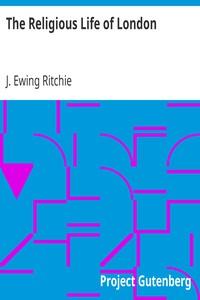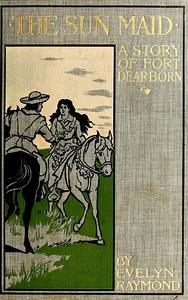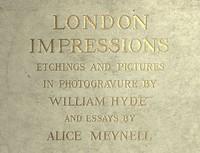Read this ebook for free! No credit card needed, absolutely nothing to pay.
Words: 91378 in 10 pages
This is an ebook sharing website. You can read the uploaded ebooks for free here. No credit cards needed, nothing to pay. If you want to own a digital copy of the ebook, or want to read offline with your favorite ebook-reader, then you can choose to buy and download the ebook.


: The Religious Life of London by Ritchie J Ewing James Ewing - Religious thought England London; London (England) Religion
The original meaning of the word heresy is choice. "It was long used," writes Dr. Waddington, "by the philosophers to designate the preference and selection of some speculative opinion, and in process of time was applied without any sense of reproach to every sect." The most fruitful source of speculative opinion is, and has ever been, religion; from the schools of philosophy to those of theology the term heresy passed by a very intelligible and simple process. The word is thrice used in the Acts to denote sect , and Paul himself when on his defence before Felix and in answer to Tertullus confesses that "after the way which they call heresy, so worship I the God of my fathers."
In process of time heresy came to have a bad meaning attached to it. It is easy to see why this should be so. We naturally prefer our own opinions to those of other people. We naturally prefer the society of those who hold our own opinions to the society of those who do not. Life is short, and we do not want to be always disputing. Life to most of us is hard, and it would be harder still if after a day's toil Paterfamilias had to discuss the three births of Christ, or His twofold nature, the AEons of the Gnostics, the Judaism of the Ebionites, the ancient Persian dualism which formed the fundamental idea of the system of Manes, or the windy frenzy of Montanus, with an illogical wife, a friend gifted with a fatal flow of words, or a pert and shallow child. We like those with whom we constantly associate. They are wise men and sound Christians. They are those who fast and pay tithes, and are eminently proper and respectable. As to the heretics--the publicans and sinners, away with them. Let their portion be shame in this life, perdition in the next. Thus it is heretics have got a bad name. Church history has been written by their enemies, by men who have honestly believed that a man of a different heresy to their own would rob an orphan, and break all the commandments. The Rev. Mr. Thwackem "doubted not but all the infidels and heretics in the world would, if they could, confine honour to their own absurd errors and damnable deceptions." The phrase "absurd errors and damnable deceptions," is one a real theologian might envy, or at any rate appropriate. In another sense also that hero of fiction is a type of the spirit in which orthodox people often have written on theology. "When I mean religion," cries Thwackem, "I mean the Christian religion, and not only the Christian religion, but the Protestant religion, and not only the Protestant religion, but the Church of England."
Still the question occurs, What is heresy?
It is not difficult to say what it is not. The African Bishops on one occasion, in council in Carthage, decided that heretics were not at all any part of the Church of Christ, but this opinion was modified by a later council. "Heretics," writes Epiphanius, "are divided into two kinds: those who receive the Christian religion, but err in parts, who when they come over to the Church are anointed with oil; and those who do not receive it at all and are unbelievers, such as Jews and Greeks, and these we baptize."
Yet the Church of England is tolerant, to a certain extent, of heresy. The judicious Hooker writes, "We must acknowledge even heretics themselves to be a maimed part, yet a part, of the visible Church. If an infidel should pursue to death an heretic professing Christianity only for Christian profession's sake, could we deny unto him the honour of martyrdom? Yet this honour all men know to be proper unto the Church. Heretics, therefore, are not utterly cast out from the visible Church of Christ. If the Fathers do, therefore, anywhere, as often they do, make the true visible Church of Christ and heretical companies opposite, they are to be construed as separating heretics not altogether from the company of believers, but from the fellowship of sound believers. For where professed unbelief is, there can be no visible Church of Christ; there may be where sound belief wanteth. Infidels being clean without the Church, deny directly and utterly reject the very principles of Christianity which heretics embrace, and err only by misconstruction, whereupon their opinions, although repugnant indeed to the principles of Christian faith, are notwithstanding by them held otherwise and maintained as most consistent therewith." The Privy Council by its Judgment of "Essays and Reviews" has decided that a Churchman may hold heretical opinions.
In popular language, the Congregationalists, the Baptists, the Presbyterians are orthodox; the Quakers, the Methodists, Wesleyans and otherwise, are orthodox; for our purpose popular language is sufficient.
Heresy, says Tertullian, is the result of wisdom, real or assumed. He writes: "The philosophers are the fathers of the heretics." It is computed that there have been no less than five hundred distinct heresies. Happily for us, most of them are dead and buried in Greek and Latin folios, rarely read and still more rarely understood. The East was the land of heresy. Every day saw the birth of a new one amongst a people of subtle intellect and endowed with a language wonderfully contrived to express the most delicate and phantasmal forms of belief. We laugh at the schoolmen, at their barbarous Latin and incomprehensible disputations. No one now ventures to discuss how many angels could stand upon the point of a needle, but in the early ages of the Church the Fathers wasted their lives in disputations equally windy and barren of practical result. "Greek Christianity," writes Dean Milman, "was insatiably inquisitive, speculative. Confident in the inexhaustible copiousness and fine precision of its language, it endured no limit to its curious investigations. As each great question was settled or worn out, it was still ready to propose new ones. It began with the Divinity of Christ, still earlier perhaps with some of the gnostic cosmogonical or theophanic theories, so onward to the Trinity; it expired, or at least drew near its end, as the religion of the Roman East, discussing the Divine light on Mount Tabor." Extinct long ago are the questions to settle which Church councils were held, fanatic monks swarmed into Constantinople by hundreds from far away--Syrian, or Arabian, or African deserts--and armies took the field. Even a vowel might stir up strife and bloodshed. The enmity of the Homoousian to the Homiousian was as bitter as that between Guelph and Ghibelline, as that of Capulet and Montague; and only the pen of a Swift could do justice to the brawls
"Bred of an airy word."
The Bishops by this Act received arbitrary power to arrest and imprison on suspicion, without check or restraint of law, at their will and pleasure. Prisoners who refused to abjure their errors, who persisted in heresy or relapsed into it after abjuration, were sentenced to be burnt at the stake.
Fortunately for our readers, religious London is not thus minutely divided and subdivided. We have still absurd squabbles, that for instance whether Mr. Mackonochie was kneeling or only bending, being pre-eminently so; yet on the whole in Western Europe and among the German races the tendency is more and more to practical, and less and less to speculative life. In another way also may the comparatively speaking undisturbed orthodoxy of Western Europe be accounted for. For the orthodox there have been cakes and ale, and even the ass knoweth his owner and the ox his master's crib. Nothing so keeps men from religious speculation as a good endowment. In his "History of Latin Christianity," Dean Milman very significantly writes: "The original independence of the Christian character which induced the first converts in the strength of their faith to secede from the manners and usages, as well as the rites of the world, to form self-governed republics, as it were, within the social system; this noble liberty had died away as Christianity became an hereditary, an established, a universal religion." The poet asked, and he might well do so--
"What makes all doctrines plain and clear? About two hundred pounds a year."
It has thus come to pass that heresy in London and the country has been confined within narrow bounds. Whatever Churchmen may have thought, the creed and the public utterances of the Church have been orthodox. Popular dissent has followed suit--heresy has been avoided by some as a temptation of the devil, by others as an obstacle to worldly success, but no religious life can exist without it. In the religious world, as a rule, heresy is life, orthodoxy death. "Are you a Christian?" asked one well-known man of another. "When I am a good man," was the reply; but, say the orthodox, it is on his belief or rejection of dogmas that a man's Christianity depends. One cheering sign of the times is that the religious public is beginning to realize the fact, that it does not follow that because a man holds heretical opinions he will pick your pocket, elope with your wife, or make away with your silver spoons. It is well when people come to think that there may be something purer, higher, holier, than unreasoning uniformity of opinion or than a blind assent to scholastic terms and definitions. Mental stagnation is not Christian life, neither does sterile orthodoxy deserve the name. It was the recognition of this idea that gives to the Apostle John a special claim to admiration and regard. "If," says he, "a man say I love God and hateth his brother, he is a liar; for he that loveth not his brother, whom he hath seen, how can he love God, whom he hath not seen?" It was under the influence of the same spirit that the Master rebuked the zeal of his disciples when they would have hindered one who was according to their own account doing good, merely because "he followed not us." The passage is worth transcribing. "And John answered him, saying, Master, we saw one casting out devils in thy name and he followeth not us, and we forbade him, because he followeth not us. But Jesus said, Forbid him not, for there is no man which shall do a miracle in my name that can lightly speak evil of me; for he that is not against us is on our part. For whosoever shall give you a cup of water in my name because ye belong to Christ, verily I say unto you he shall not lose his reward."
Free books android app tbrJar TBR JAR Read Free books online gutenberg
More posts by @FreeBooks

: The Sun Maid: A Story of Fort Dearborn by Raymond Evelyn - Chicago (Ill.) History To 1875 Fiction; Indian captivities Illinois Fiction; Fort Dearborn (Ill.) Fiction


: London Impressions: Etchings and Pictures in Photogravure by Meynell Alice Hyde William Henry Illustrator - London (England) Description and travel; London (England) Pictorial works





